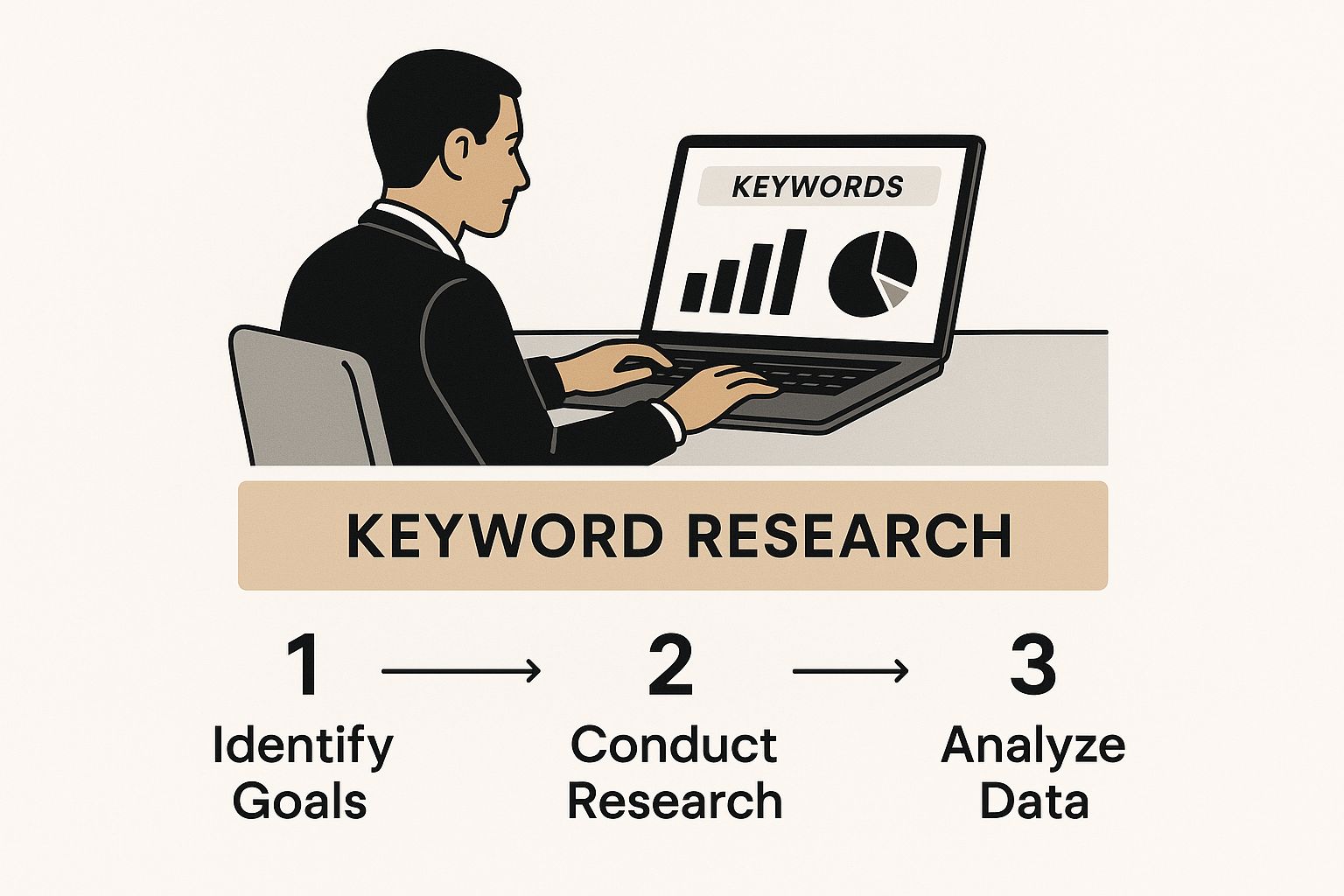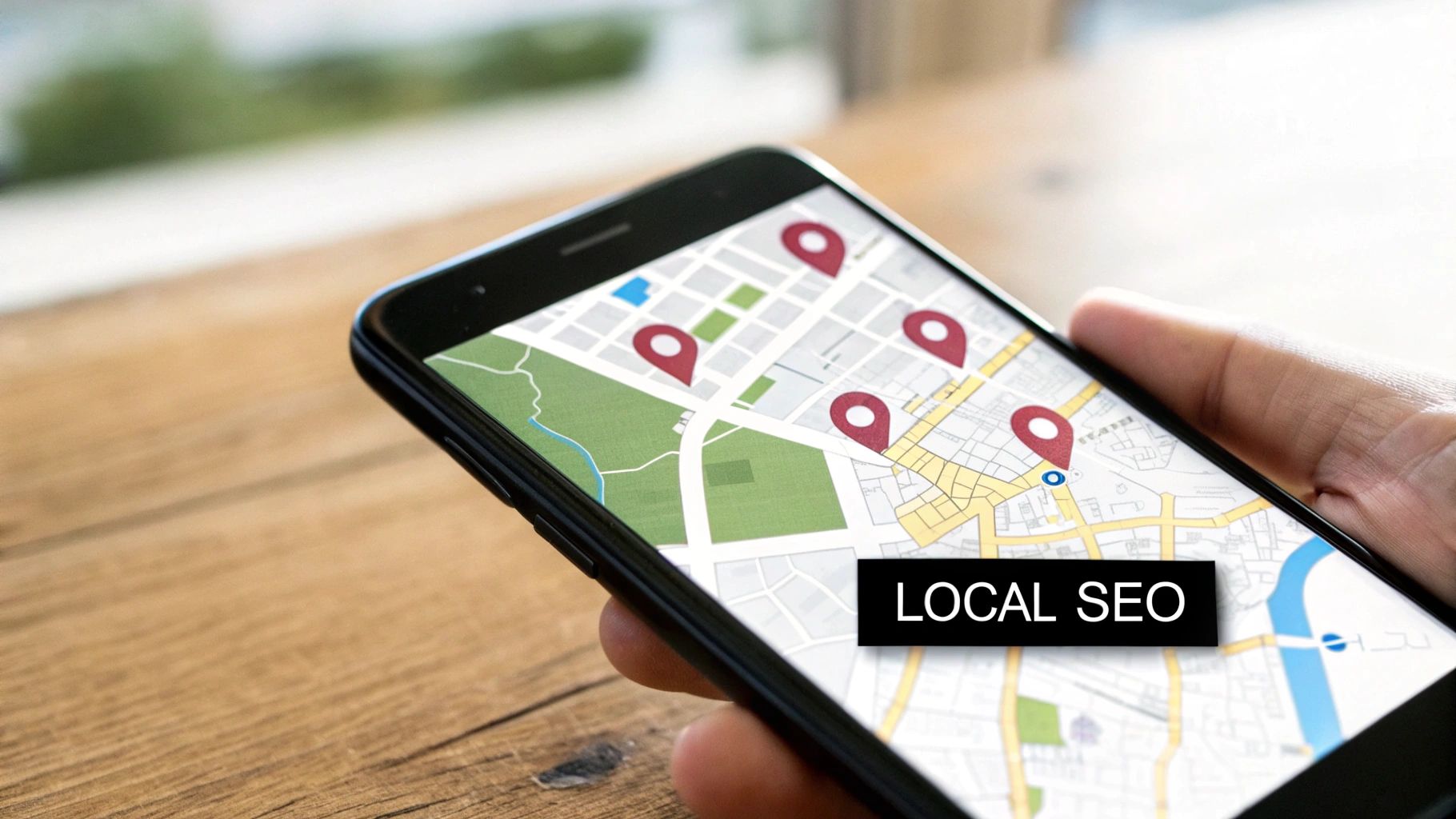When a pipe bursts at 2 AM, homeowners aren't flipping through a phone book. They’re grabbing their phones and searching for help—fast. For restoration companies, effective SEO is what puts your business in front of those desperate homeowners right when they need you. It's not just marketing; it's about being the first, most trusted solution they find in a crisis.
Why is SEO so important for a restoration company?
Your business is built on emergency calls. A strong online presence is the most direct way to get more of those high-value leads and grow your business. When disaster strikes, potential customers aren't casually browsing. They are searching for immediate help, and the company that shows up first is almost always the one that gets the call.
This is where a solid SEO strategy becomes your most valuable player. It's the engine that makes sure your company pops up at the top of Google for searches like "emergency water damage cleanup near me" or "fire restoration services in [Your City]."
Visibility Equals Trust in a Crisis
In an emergency, trust is everything. A homeowner needs to feel confident that the team they’re calling is legit, skilled, and ready to roll right now. Simply appearing on the first page of Google gives you an instant dose of credibility. It's human nature—we instinctively trust the businesses that search engines recommend first.
Organic search is the single biggest driver of quality leads for restoration companies. In fact, 95% of your marketing success depends on a first-page ranking, with the very top result gobbling up a massive 60% of all clicks.
Companies that invest in a strong SEO foundation often see a huge jump in qualified leads, sometimes 150% or more, compared to those who don't.
In Short: A high ranking does more than just bring website traffic. It builds the immediate trust you need to turn a panicked searcher into a paying customer.
The Competitive Advantage of Being First
The restoration market is fierce. If people can't find you online, you can bet your local competitors are taking the calls that should have been yours. The top-ranked companies don't just get more leads; they own their local service areas.
They do this by consistently appearing in both the regular search results and the all-important Google Maps pack. Mastering https://clicksgeek.com/local-maps-seo/ is essential if you want to claim those top spots.
Beyond just rankings, you have to understand the unique demands of the emergency restoration industry to turn SEO wins into real growth. Your digital presence must mirror your real-world readiness. Without a robust SEO plan, you're basically invisible when your customers need you most.
Winning the 'Near Me' Search Every Time
Let's be real. When a pipe bursts, people search for "water damage restoration near me." That search is your golden ticket. If you don't show up, you don't exist. This is why mastering local SEO is your most powerful weapon for getting those urgent, high-value calls.
For any local business, the battle for "near me" searches is won or lost on Google. It all starts with your Google Business Profile. Your GBP isn't just a map pin; it's your digital storefront. It’s the first thing a panicked homeowner sees.
This infographic gives you a peek into how an SEO pro thinks about keyword research for a winning local strategy.

As you can see, understanding what your customers are searching for is the bedrock of getting found.
Your Google Business Profile Is Your Local SEO Engine
Your GBP is more than a simple listing. It's an interactive profile that feeds Google—and potential customers—all the critical information they need to choose you. A half-baked profile just won't cut it.
Here’s where you need to get laser-focused:
- Primary Category: Get this right. Choose "Water damage restoration service" if that's your main service.
- Secondary Categories: Don't stop there. Add everything else you do, like "Fire damage restoration service" or "Mold remediation." This helps you cast a wider net.
- Services: This is your chance to shine. Don't just list "water damage." Break it down. List "burst pipe cleanup," "sewage backup removal," and "flood damage repair" with detailed descriptions.
The more specific you are, the more confident Google becomes in showing your business to the right people. You can dive deeper into ranking higher on Google with local SEO.
The Power of Consistent NAP Information
One of the most fundamental—and often messed up—parts of local SEO is your NAP (Name, Address, Phone Number). Any inconsistency across the web can create confusion for search engines and hurt your rankings.
If your GBP says "Acme Restoration Inc." but your Yelp profile just says "Acme Restoration," Google’s algorithm sees a mismatch and loses a little trust. It’s a small detail with huge consequences.
In Short: Your NAP needs to be an identical copy everywhere online. That means your website, all social media profiles, and every business directory. Consistency builds authority.
Why Local Citations Still Matter
Local citations are mentions of your business's NAP on other websites. Think of them as online endorsements. Each one tells Google that you're a legitimate local business. The more high-quality citations you have, the better.
Where should you get them?
- Industry-Specific Directories: Getting listed on sites like HomeAdvisor or Angie's List is a no-brainer.
- Local Directories: Don't forget your local Chamber of Commerce or other city-based business listings.
- Data Aggregators: These services push your consistent business info out to hundreds of other online directories.
Local SEO is the lifeblood of your marketing. Four out of five consumers use search to find local businesses. A focused local SEO campaign can boost organic traffic by 581% for disaster recovery firms. Plus, actively optimizing your Google Business Profile can help you rank 20–30% higher for those critical, time-sensitive searches.
People Also Ask About Local SEO
-
How do I get my restoration company to show up on Google Maps?
It all starts with creating and verifying your Google Business Profile. From there, fill out every single section, upload high-quality photos, consistently get new reviews, and make sure your NAP is consistent everywhere. -
What are the best categories for a restoration company on GBP?
Your primary category should be your main service, like "Water damage restoration service." Then, layer in secondary categories for everything else you offer, such as "Fire damage restoration service," "Mold remediation," and even "Contractor" to cover all your bases. -
Does responding to Google reviews help my SEO?
Yes, 100%. Responding to every review—good and bad—sends a powerful signal to Google that you're an active, engaged business that cares about its customers. That's a ranking factor you don't want to ignore.
Your Website: The Digital First Responder
Getting a potential customer to click on your site is just the first step. If a homeowner with a flooded basement finds a site that’s slow, confusing, or unprofessional, they're gone. They'll hit that back button before you can say "water damage."
They're in a crisis. They don’t have time to hunt for a phone number. Your website has about five seconds to build instant trust and show them where to get help.
If it can't do that, you've lost the job.

Structure Your Site for Urgency
A messy website is a lead-killer. You can't just lump everything under a generic "Services" page. A stressed property owner needs to see their specific problem addressed immediately. The smartest approach to SEO for restoration companies is building dedicated pages for each core service.
This isn’t just good for users; it’s fantastic for Google. It means creating separate pages for things like:
- Water Damage Restoration: Talk about everything from burst pipes to flood cleanup.
- Fire Damage Restoration: Detail your process for smoke, soot, and structural repairs.
- Mold Remediation: Explain how you inspect, remove mold, and prevent its return.
- Storm Damage Repair: Cover issues caused by wind, hail, or other weather events.
By optimizing each page for specific keywords, you're not just helping customers. You're telling Google exactly what you specialize in, which makes it easier to rank for those high-value emergency searches.
Nail the On-Page and Technical Stuff
Beyond a clean structure, the technical health of your website is a huge factor. Google’s main job is to give users a good experience. For the restoration industry, that means a site that’s flawless on a phone.
Most of your emergency calls will come from someone searching on their mobile device. If your site is sluggish or hard to navigate on a small screen, you're losing business. A study by WPForms found that 75% of consumers research a business online before making contact. A clunky mobile site is a huge red flag.
In Short: Your website's speed and mobile-friendliness are non-negotiable parts of your SEO and sales process. A fast, clean mobile experience often decides whether a customer calls you or your competitor.
If you want to see what a great mobile experience looks like, this guide on how to build a mobile landing page has some fantastic examples.
Key On-Page SEO Elements for Restoration Websites
To get each service page ranking, you need to send clear signals to Google about what the page is about. This is where on-page SEO comes in.
Here’s a quick breakdown of the most important elements for every service page.
| Key On-Page SEO Elements for Restoration Websites | ||
|---|---|---|
| SEO Element | Purpose | Example |
| Title Tag | The main headline people see in Google search results. It has to be compelling and include your keyword. | "24/7 Water Damage Restoration in Dallas |
| Meta Description | The short summary under the title in search results. Its job is to convince the searcher to click your link. | "Fast, reliable water damage cleanup in Dallas. We offer 24-hour emergency service for burst pipes, floods & more. Call now!" |
| H1 Heading | The main heading on your webpage. It should clearly match what the user was searching for. | "Emergency Water Damage Services in Dallas" |
| Local Schema | Code that helps Google instantly understand your business type, service area, and contact info. | This markup explicitly tells Google you are a "HomeAndConstructionBusiness" that serves "Dallas, TX." |
Getting these details right is fundamental. It’s how you tell both customers and search engines that you are the expert they’re looking for.
Become the Go-To Expert with Your Content
Just having a website that lists your services is table stakes. To own your local market, you have to prove you're the expert. This is where a sharp content strategy makes all the difference, turning your site from an online brochure into a helpful resource.
Picture your ideal customer's state of mind. They're panicked, stressed, and need clear answers, right now. Your content needs to meet them in that moment. It should calm their nerves and show them what to do next.
Answer Their Questions Before They Even Ask
The most effective SEO for restoration companies comes from content that directly addresses your customers' biggest fears and questions. When you create helpful blog posts, guides, and FAQ pages, you attract people who are looking for an authority.
Think about what a frantic homeowner is typing into Google at 2 AM:
- "What do I do right after a pipe bursts?"
- "Can I stay in my house after a small kitchen fire?"
- "How do I start an insurance claim for water damage?"
Every one of these questions is a golden opportunity. Creating content that gives a calm, clear answer instantly positions you as the credible expert they need.
In Short: A winning content strategy is about solving problems, not just selling services. When you become the best source for information, you naturally become the first call for the actual work.
Get Hyper-Local With Your Content
Your service area is your turf. Creating content that's laser-focused on the specific neighborhoods and towns you work in is a massive advantage for local SEO. Google loves this because it proves you're a real, local business.
This means you need to go deeper than generic service pages. Think along these lines:
- Neighborhood Guides: "A Homeowner's Guide to Preventing Mold in [Neighborhood Name]'s Humid Summers."
- Local Case Studies: "How We Handled Fire Damage Restoration for a Family in [Nearby Town]."
- City-Specific Info: "What to Know About [Your City]'s Storm Damage Repair Codes."
This hyper-local approach helps you rank for long-tail keywords. These are longer, more specific search terms with less competition but very high intent. Someone searching for "fire damage restoration in the Northwood neighborhood" is a much better lead than someone just typing "fire damage."
People Also Ask About Content
-
How often should we be posting new stuff?
Consistency beats frequency. It's better to publish one amazing, helpful article a month than four mediocre ones. Aim for one or two high-quality posts per month to start. -
What kind of content actually works for this industry?
Get practical. Think how-to guides, checklists ("The First 5 Things to Do After a Flood"), and walkthroughs of your restoration process. Visuals like before-and-after photos and video testimonials are pure gold. -
Do we really need a blog on our restoration site?
Yes. A blog is the engine that drives your content strategy. It’s the perfect home for helpful articles that answer customer questions, show your expertise, and target those priceless long-tail keywords.
By consistently putting out content that educates and helps your community, you're building a brand that people trust.
Your Reputation is Everything: Building Links and Racking Up Reviews
In the restoration business, trust is everything. A homeowner is trusting you to put things back together after a disaster. While your website sets the stage, your real reputation is built off-site.
This is where backlinks and online reviews come in. Think of them as the digital equivalent of a neighbor's recommendation. They tell Google—and customers—that you’re the real deal.
A backlink is just a link from someone else's website to yours. When a respected local plumber links to your site, it’s a vote of confidence. In the same way, a steady flow of glowing reviews on Google shows a panicked homeowner that you’re the one to call.
Building Backlinks That Actually Matter
Forget old-school, spammy link-building. We're talking about earning genuine, relevant links from other businesses in your community.
How do you get them? It boils down to building real-world relationships.
- Team Up with Other Trades: Plumbers, electricians, roofers, and public adjusters are your natural allies. Offer to write a guest post for their blog, like, "What Homeowners Should Do After a Major Pipe Burst." In the article, you naturally link back to your website.
- Get Involved Locally: Sponsoring a local little league team or charity run usually gets you a link on their website. It's a fantastic local signal for Google.
- Join the Chamber of Commerce: This is a no-brainer. Most local chambers have an online member directory. Getting listed is often one of the easiest and most authoritative local backlinks you can get.
In Short: The best backlinks for a restoration company are local and relevant. Don't chase links from random websites. Focus on who you know in your town.
Become the Obvious Choice with 5-Star Reviews
Picture this: a homeowner’s basement is flooding. They Google "water damage restoration near me" and look at two things: your star rating and how many reviews you have.
The company with a 4.9-star rating and 85 recent, positive reviews will get the call over a company with a 3-star rating. Every. Single. Time. Responding to every review—good and bad—also shows you're a pro who cares.
How to Get Reviews Without Being Pushy
You need a simple, repeatable process.
- Do a Great Job: A truly happy customer is the only source of a genuine 5-star review.
- Ask at the Perfect Moment: The best time to ask is right after the job is done. Train your techs to say something simple, like, "We're so glad we could help. When you have a minute, a review on Google would mean the world to our team."
- Make It Simple: Follow up within 24 hours. Send a text or email with a direct link to your Google review page. The fewer clicks it takes, the higher the chance they'll do it.
Handling Every Review Like a Pro
How you respond is almost as important as the review itself.
- The Glowing 5-Star Review: Always say thank you. Make it personal by mentioning their name and a small detail from the job.
- The Dreaded 1- or 2-Star Review: Respond quickly and publicly. Apologize that they had a bad experience and offer to take the conversation offline. Try this: "We are so sorry this was your experience, and we want to make it right. Please call me, [Owner's Name], directly at [Phone Number] so I can personally address this."
People Also Ask About Reputation
-
What's a good number of Google reviews to have?
It’s all about your local competition. Look at the top 3 restoration companies in your area. Your goal is to have more reviews and a better overall star rating than them. A steady trickle of new reviews is better than a hundred old ones. -
Can I offer a gift card for a good review?
Nope. Don't do it. This is a big no-no with Google and can get your listing penalized. Earn reviews the honest way: provide amazing service and make it easy for happy customers to give feedback. -
Where else should I get reviews besides Google?
Google is king, but reviews on other platforms build more credibility. Check if people in your area use Yelp, Angi, or the Better Business Bureau (BBB). Focus on Google first, then one or two others that are popular locally.
Your Top Restoration SEO Questions Answered
When you're trying to figure out SEO for your restoration business, a lot of questions pop up. Let's cut through the noise and get you some clear, no-nonsense answers.

How long does SEO take to work for a restoration company?
SEO is a marathon, not a sprint. Think of it like building a solid reputation in your community—it doesn’t happen overnight.
You'll likely see some encouraging signs within the first 3 to 6 months, especially with local map rankings. But for the really tough keywords like "water damage restoration," you should plan on a 6 to 12-month journey to start cracking the top spots.
The timeline can shift based on:
- Your Market: Are you in a major city with tons of competitors, or a smaller town?
- Your Starting Point: Is your website brand new, or does it have some history?
- Your Effort: How consistently are you adding content and getting reviews?
In Short: The results you build with good SEO have staying power. Unlike paid ads that disappear when you stop paying, a strong organic ranking is a long-term asset that keeps generating leads.
Should I put my money on SEO or PPC ads?
The smartest strategy? Use both, especially when you're getting started. This isn't an "either/or" choice.
PPC ads are incredible for making the phone ring right now. They deliver immediate leads, which is perfect for keeping your crews busy while your SEO campaign gets up to speed.
SEO, on the other hand, is your long game. It builds organic trust that becomes your most profitable and consistent source of jobs. Use PPC for urgent, high-intent emergency calls while you steadily invest in an SEO foundation.
What is the most important part of SEO for restoration companies?
If I had to pick just one thing, it would be Local SEO. For virtually every restoration company, this is the bedrock of your marketing plan.
Your customers are in a specific geographic area, they're panicking, and they need help fast. That makes your Google Business Profile (GBP) your single most valuable digital asset. Period.
Having a fully optimized GBP isn't optional. It needs:
- 100% accurate business info (Name, Address, Phone).
- A steady flow of new, positive customer reviews.
- Recent, high-quality photos of your team and work.
- Active use of Google Posts to share updates.
If you can dominate the local map pack in your service area, you will be the first company people see at the exact moment they need you most.
Ready to stop wondering and start ranking? The team at Clicks Geek specializes in turning your website into a lead-generating machine with proven SEO and paid ad strategies. Let us handle the marketing so you can focus on what you do best. Get in touch with us today!
Is Your Business Ranking in Google Maps?
Turn Google Maps into a Lead Engine w/ Clicks Geek’s AI-powered local SEO. 3,000+ clients served. Our proprietary, fully done-for-you Maps SEO system handles everything—keyword targeting, local optimization, content, reviews, and ranking strategy—automatically.






